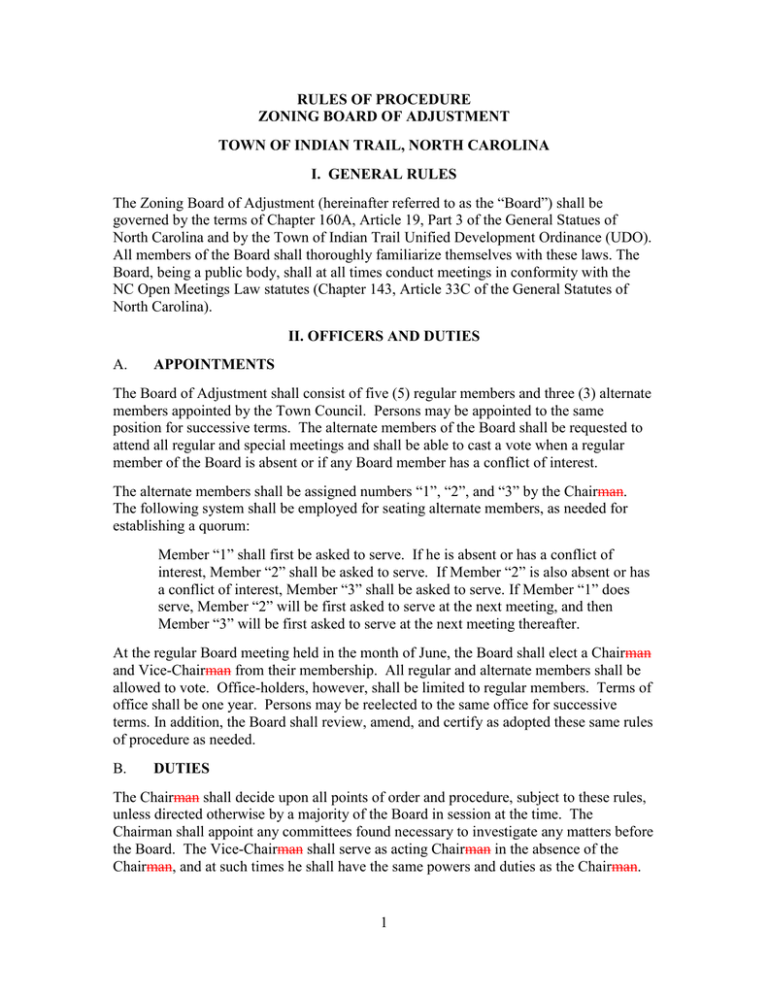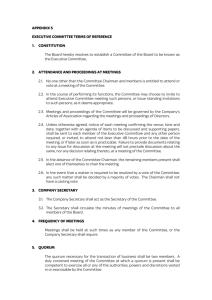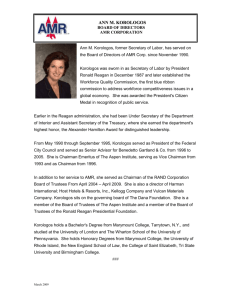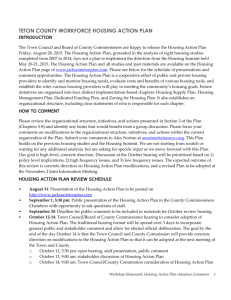i. general rules - Town of Indian Trail
advertisement

RULES OF PROCEDURE ZONING BOARD OF ADJUSTMENT TOWN OF INDIAN TRAIL, NORTH CAROLINA I. GENERAL RULES The Zoning Board of Adjustment (hereinafter referred to as the “Board”) shall be governed by the terms of Chapter 160A, Article 19, Part 3 of the General Statues of North Carolina and by the Town of Indian Trail Unified Development Ordinance (UDO). All members of the Board shall thoroughly familiarize themselves with these laws. The Board, being a public body, shall at all times conduct meetings in conformity with the NC Open Meetings Law statutes (Chapter 143, Article 33C of the General Statutes of North Carolina). II. OFFICERS AND DUTIES A. APPOINTMENTS The Board of Adjustment shall consist of five (5) regular members and three (3) alternate members appointed by the Town Council. Persons may be appointed to the same position for successive terms. The alternate members of the Board shall be requested to attend all regular and special meetings and shall be able to cast a vote when a regular member of the Board is absent or if any Board member has a conflict of interest. The alternate members shall be assigned numbers “1”, “2”, and “3” by the Chairman. The following system shall be employed for seating alternate members, as needed for establishing a quorum: Member “1” shall first be asked to serve. If he is absent or has a conflict of interest, Member “2” shall be asked to serve. If Member “2” is also absent or has a conflict of interest, Member “3” shall be asked to serve. If Member “1” does serve, Member “2” will be first asked to serve at the next meeting, and then Member “3” will be first asked to serve at the next meeting thereafter. At the regular Board meeting held in the month of June, the Board shall elect a Chairman and Vice-Chairman from their membership. All regular and alternate members shall be allowed to vote. Office-holders, however, shall be limited to regular members. Terms of office shall be one year. Persons may be reelected to the same office for successive terms. In addition, the Board shall review, amend, and certify as adopted these same rules of procedure as needed. B. DUTIES The Chairman shall decide upon all points of order and procedure, subject to these rules, unless directed otherwise by a majority of the Board in session at the time. The Chairman shall appoint any committees found necessary to investigate any matters before the Board. The Vice-Chairman shall serve as acting Chairman in the absence of the Chairman, and at such times he shall have the same powers and duties as the Chairman. 1 C. SECRETARY The Town Council shall arrange to have secretarial duties performed for the Board. Said person(s) (hereafter referred to as the “Secretary”), subject to the direction of the Chairman, shall take minutes and keep all records. The Secretary shall conduct all correspondence of the Board, arrange for all public notices required to be given, notify members of pending meetings and their agenda, notify parties to cases before the Board of its decision on such cases, and generally supervise the clerical work of the Board. The Secretary shall keep in a permanent volume the minutes of every meeting of the Board. These shall show the record of all important facts pertaining to each meeting and hearing, every resolution acted upon by the Board, and all votes of the members of the Board upon any resolution or upon the final determination of any question, indicating the names of members absent or failing to vote. If the Secretary is appointed from outside the membership of the Board, he shall not be eligible to vote upon any matter. The minutes of the Board of Adjustment shall be kept by the Secretary for the public at the Town Hall in both audio and written format, and shall serve as the official records of the Board. III. A. RULES OF CONDUCT FOR MEMBERS Removal Members of the Board may be removed by the Town Council for cause, including violation of the rules stated below herein. B. Attendance In order for the Board to carry out its duties and responsibilities, it is necessary for all members to attend the meetings. If any regular member is absent for three (3) consecutive regular meetings within any twelve-month period, such member may be removed by the Town Council and a replacement made for the unexpired portion of the term. Alternate members may be removed by the Town Council for repeated failure to attend or participate in meetings when requested to do so. The Board of Adjustment may make a recommendation to the Town Council regarding removal of a member for duly cited causes. Such a request must be in writing, and signed by the Chairman of the Board of Adjustment. C. Conflicts of Interest No member of the Board of Adjustment shall seek to influence a decision, participate in any action or cast a vote involving any matter that is before the Board which may result in a private benefit to themselves, their immediate relatives or their business interest. A member may be excused from voting on a particular issue under the following circumstances: A member of any Board exercising quasi-judicial functions pursuant to this UDO shall not participate in or vote on any quasi-judicial matter in a manner that would violate affected persons’ constitutional rights to as impartial decision maker. Impermissible violations of due process include, but are not limited to the following; 2 1. If the member has a direct financial interest in the outcome of the matter at hand; or undisclosed ex parte communications; or 2. If the member has engaged in undisclosed ex parte conversation regarding the matter at hand; or a close familial, business, or other associational relationship with an affected person; or 3. If the member has such close personal ties (i.e., familial) to the applicant that he cannot reasonably be expected to exercise sound and impartial judgement on behalf of the public’s interest; or a financial interest in the outcome of the matter; or 4. If the member has made a pre-determined and/or has a fixed opinion on the matter at hand. a member having a fixed opinion prior to hearing the matter that is not susceptible to change. If a Board member determines that he may have a conflict of interest on a particular issue, he shall fully disclose the nature of such conflict and ask to be excused from any deliberations or voting on the issue related to such conflict. The remaining regular members, by majority vote, shall determine whether such conflict exists and whether said member may be excused from further deliberations on said matter. If a member is excused, he shall either: 1) be seated in the audience and not participate in any further discussion on said matter, or 2) he shall leave the meeting room during all deliberations pertaining to such matter, whichever option the Chairman decides is the most expedient and practical for the matter at hand. In no instance may a member be excused from voting merely due to an unwillingness to vote on the issue at hand, and when no conflict of interest is found to exist. A challenge to the existence of a conflict of interest or a challenge of an undisclosed conflict of interest may be filed by any interested party with the Board. Such a challenge may be an appeal for a review of the findings of the Board or may be for the purpose of alleging an undeclared conflict of interest. Any challenge made to the Board shall be supported by competent evidence and shall be submitted at a properly convened meeting of the Board. The Board shall hear all evidence and, by majority vote of the remaining regular members, shall make the final determination as to the existence of a conflict of interest. In the event a Board member is found to have a conflict of interest and is excused from voting by the Board, he shall be replaced by an alternate member for that business associated with the specific conflict of interest. D. Discussion of Board Cases Board members shall refrain from discussing upcoming matters of business with any parties, including other Board members, prior to the meeting at which such items are to be publicly discussed; provided however, that members may receive and/or seek general technical information pertaining to the case from the Secretary, Town Manager, Town Attorney or Zoning Administrator prior to the Board meeting at which the case is to be 3 heard. The Board also has the discretion to call forth any witnesses for a particular case by subpoena power, if necessary. IV. A. MEETINGS Regular Meetings Regular meetings of the Board shall be held on the fourth Thursday of each month at 7:00 6:30 P.M. at the Civic Building Town Hall; provided that meetings may be held at any other conveniently located place in the Indian Trail area if directed by the Chairman in advance of the meeting. Each member (including the alternate members) shall be notified of each meeting by the Secretary. B. Special Meetings Special meetings of the Board may be called at any time by the Chairman provided that there is at least forty-eight (48) hours written notice of the time and place of a special meeting given and posted publicly, by the Board’s Secretary, to each member of the Board including the alternate members. C. Cancellation of Meetings Whenever there are no appeals, interpretations, special use permit, applications for variances, or other business for the Board, or whenever so many regular and alternate members notify the Secretary of their inability to attend that a quorum will not be available, the Chairman may dispense with a regular meeting by having the Secretary give written or oral notice to all members prior to the time set for the meeting. D. Voting The Board shall not pass upon an appeal, special use permit, interpretation, or application for a variance when there are less than four (4) voting members present. Any less than 4 voting Board members results in a lack of quorum, which suspends any action that can be taken. No more than five (5) regular and alternate members may vote on any matter for which a public hearing was held. Unless as otherwise necessitate a public hearing shall include all regular and alternate members in attendance. The Chairman shall be able to vote on any matter, including making and seconding a motion. A newly appointed Board member may vote on an application or appeal if they have listened to the audio recordings, read all of the evidence and information, and have become familiar with the facts of the case. E. Conduct of Meetings All meetings shall be open to the public. The order of business at all meetings shall be as follows: 1. Call to Order 4 2. Roll Call; Determination of Quorum 3. Approval of Minutes of Previous Meetings 4. Hearing of Cases 5. Other Business 6. Adjourn F. Continuation of Meetings 1. If a continuance is requested at a public hearing on any matter by an applicant or by the Board, the Board shall follow the procedure for granting a continuance as stated in Indian Trail UDO Section 310.070. 2. If a continuance is granted by the Board, the Chairman shall announce the date, time and location for the continued case to be heard at the next regularly scheduled Board meeting. No additional notice is required in such a situation. 3. If a special meeting is called for in a continuance situation, such meetings shall follow the procedures in these rules of procedure, the UDO, and NC General Statutes for special meetings. V. A. PUBLIC HEARINGS Types of Matters to Be Heard by the Board The Board shall hear the following matters: 1. 2. 3. 4. 5. B. Appeals; Interpretations; Special Use Permits (SUP’s); Variances; and Any other matters, as required by the UDO. Procedure for Filing Matters to Be Heard by the Board 1. Appeals: No appeal shall be heard by the Board unless a completed application is filed within thirty (30) days after the interested party or parties received notice of the order, requirement, decision, or determination by the Zoning Administrator. All such applications shall be filed with the Zoning Administrator. 2. Interpretations: The Zoning Administrator may file an application for an interpretation of the Town’s Official Zoning Map at any time. All applications shall be made upon the form furnished by the Town for that purpose, and all information required thereon shall be complete before an appeal shall be considered as having been filed. 5 3. Discretionary Decisions: An applicant may also bring, in a timely and complete fashion, the following for review and decision by the Board: a. Special Use Permits (SUP’s). b. Variances. c. Any other matters, as required by the UDO. C. Fees A fee, in accordance with a fee schedule adopted by the Town Council, shall accompany all applications to be heard by the Board. This fee shall be exempted for an application initiated by the Zoning Administrator. No application shall be considered complete unless accompanied by the fee as herein prescribed. D. Public Hearing Mandate A public hearing conducted by the Board shall be required to: 1. Decide all appeals and interpretations; and 2. Grant or deny any variance and/or SUP w/fair and reasonable and appropriate conditions as are mutually agreed between the applicant and the Board; and 3. Hear and decide all other matters referred to the Board, or upon which they are required to approve or disapprove. E. Public Hearing Date After receipt of a completed application for an appeal, interpretation, SUP, variance, or other related matter under the jurisdiction of the Board, the Board shall hear the case at a regular or special meeting within forty-five (45) days from the date of submittal of the complete application, provided that a quorum of the Board can be established. F. Conduct of Hearing All Board public hearings shall be conducted in a quasi-judicial manner. Any party to a case may appear in person, by agent, or by attorney at the hearing. The order of business for public hearings shall be as follows: 1. The Chairman, or such person as he shall direct, shall give a preliminary statement of the case, along with explaining all procedures and processes for the public hearing. 2. All persons giving testimony shall be sworn in or affirmed by the Chair or any member acting as Chair and/or the Secretary to the Board, including all witnesses that have standing under the rules of evidence and in the case itself for either side (i.e., expert testimony regarding appraisals, etc.). Any person who, while under oath during a proceeding before the Board of Adjustment, willfully swears falsely is guilty of a Class 1 misdemeanor. 6 3. Staff will provide an overview of the case; providing the necessary documentation and evidence for the Board to make a reasonable and appropriate decision. 4. The applicant shall present the argument in support of his application, and shall be allowed as much time as is reasonably necessary by the Board to present their case. 5. Persons opposed to granting the application shall present the argument against the application. 6. Other persons in favor of granting the application shall present the argument for the application. 7. Both sides will be permitted to present cross-examinations and rebuttals to opposing testimony. 8. The Chairman does have the discretion to exercise reasonable time limits for those offering testimony and/or evidence at a public hearing, but doing so must not frustrate any rights for an applicant or witness to be heard. 9. The Chairman, or his their designee, shall summarize the evidence which has been presented (i.e., allowing additions by either side of the case as may be deemed practicable by the Board), giving parties the opportunity to make objections or corrections. 10. For any witnesses for or against a particular case, only competent and material evidence can be offered. 11. For all SUP’s, variances, and other discretionary decisions, the applicant shall also indicate, for the record, if they accept all of the conditions made for the permit at issue. If there are new conditions offered during the meeting by the Board, the applicant shall be given time to respond to any new conditions made. 12. Board members may ask or seek additional input, clarification, etc. from persons eligible to give evidence who are seated in the audience on any piece of evidence presented. Cross-examination and rebuttals may also be made only on any such new evidence presented. Once all of the evidence, public testimony, and general questions have been fully heard, the Chairman shall close the period for public discussion. The Board then shall publicly discuss the case without further input from the public. 13. The Board may render a decision on the matter at the public hearing or, if it so chooses, continue the public hearing to a publicly stated date, time, and location, as indicated by a motion of the Board to do so. 7 The Board of Adjustment through the Chair, or in the Chair’s absence anyone acting as Chair, may subpoena, persons with standing under G.S. 160A-393(d) may make a written request to the Chair explaining why it is necessary for certain witnesses or evidence to be compelled. The Chair shall issue requested subpoenas he or she determines to be relevant, reasonable in nature and scope and not oppressive. The Chair shall rule on any motion to quash or modify a subpoena. Decisions regarding subpoenas made by the Chair may be appealed to the full Board of Adjustment. If a person fails or refuses to obey a subpoena issued pursuant to this subsection, the Board of Adjustment or the party seeking the subpoena may apply to the General Court of Justice for an order requiring that its subpoena be obeyed. Decisions 14. G. 1. Form Written notice of the decision in a case shall be sent by personal delivery, electronic mail, or by first class mail to the applicant the owner of property that is the subject of the decision and to the party who sought the decision, if different from the owner and to all aggrieved parties who have filed a written request for such notice with the Secretary or the Chairman when the hearing is held, within five (5) working days after the case is decided. The final decision of the Board shall be filed in Town Hall. The final decision shown in the record of the case shall be entered in the minutes of the Board. Such record shall show the reasons for the determination, with a summary of the evidence introduced and the findings of fact made by the Board. 2. Voting Procedures at Hearings a. The concurring vote of four-fifths (4/5’s) of the members of the Board (i.e., at least four (4) voting members) shall be necessary to grant a variance. A majority of the members shall be required to decide any other quasi-judicial matter or to determine an appeal made in the nature of certiorari. For the purposes of this subsection, vacant positions on the board and members who are disqualified from voting on a quasi-judicial matter shall not be considered members of the board for calculation of the requisite majority if there are no qualified alternative available to take the place of such members. to reverse any order, requirement, decision, or determination of the Zoning Administrator to decide in favor of the applicant any matter upon which the Board is required to pass. This applies to all public hearings heard by the Board. b. Voting on any issue shall be done by a show of hands or by voice, as directed by the Chairman, along with their respective reasoning for their decision. In addition, each Board member shall indicate by written decision, for the record, as to their vote and reasoning for their decision. 8 H. c. An Abstention shall be counted as a “yes” vote. d. For voting procedural purposes, the following shall control: i. Absences, Vacant Seats, and/or Recusals: If there is a vacant seat on the Board, or recusal for any reason by a Board member, then that person shall not be considered a “member of the Board” for voting calculation purposes. This rule for vacancies and recusals shall not apply in voting calculations when there is a Board member absent (NCGS § 160A-388(e)). Any aggrieved party has thirty (30) days to appeal the Board’s decision to the local Superior Court by proceedings in the form of certiorari. All records of any case subject to appeal to the Superior Court shall be preserved by the Board’s Secretary, thereby allowing full access to any case records for those wishing to appeal. 9 RULES OF PROCEDURE CERTIFICATION These Rules of Procedure Governing the Town of Indian Trail Zoning Board of Adjustment are hereby reviewed, amended, and certified as adopted on this day, _____________________, 20____, by the Board as valid rules of procedure. Signed By: _____________________________________ Chairman, Indian Trail Board of Adjustment Witnessed By: ______________________________________ Secretary, Indian Trail Board of Adjustment 10






